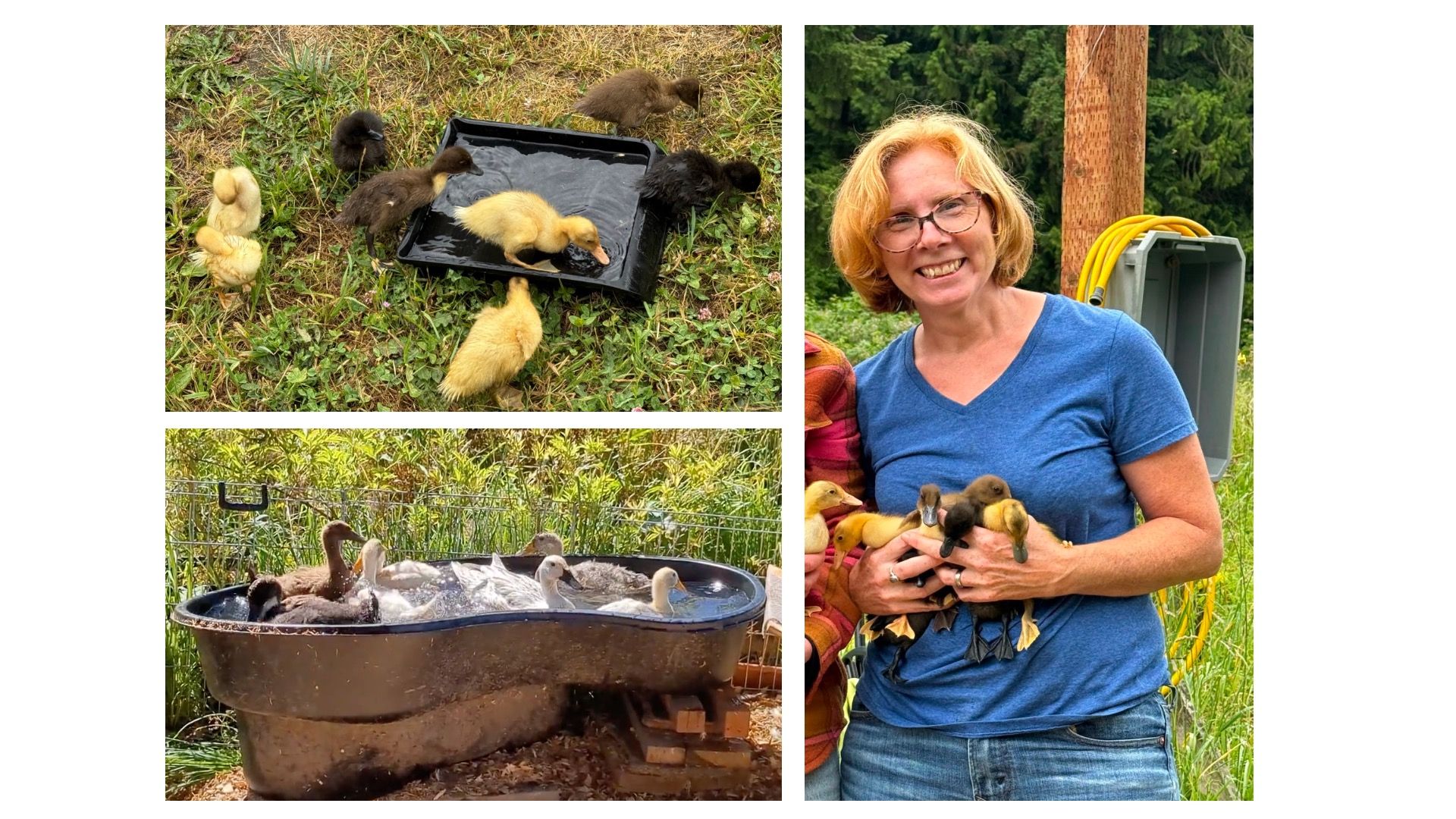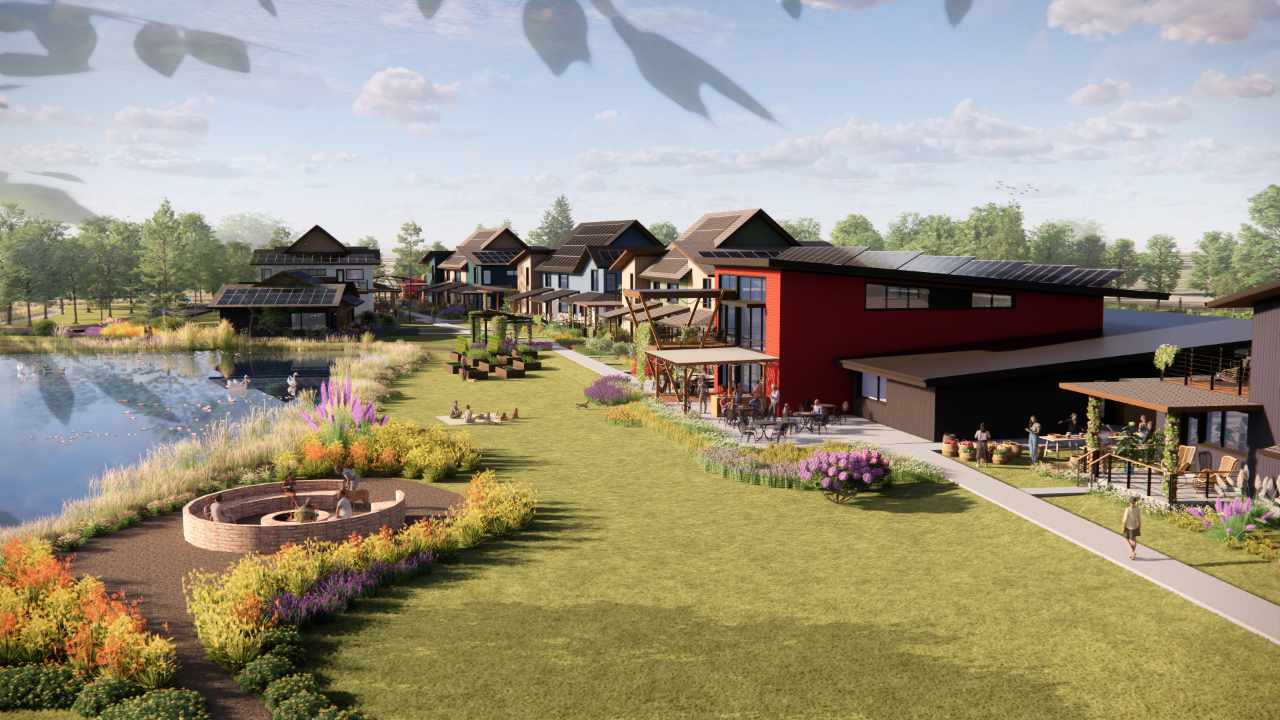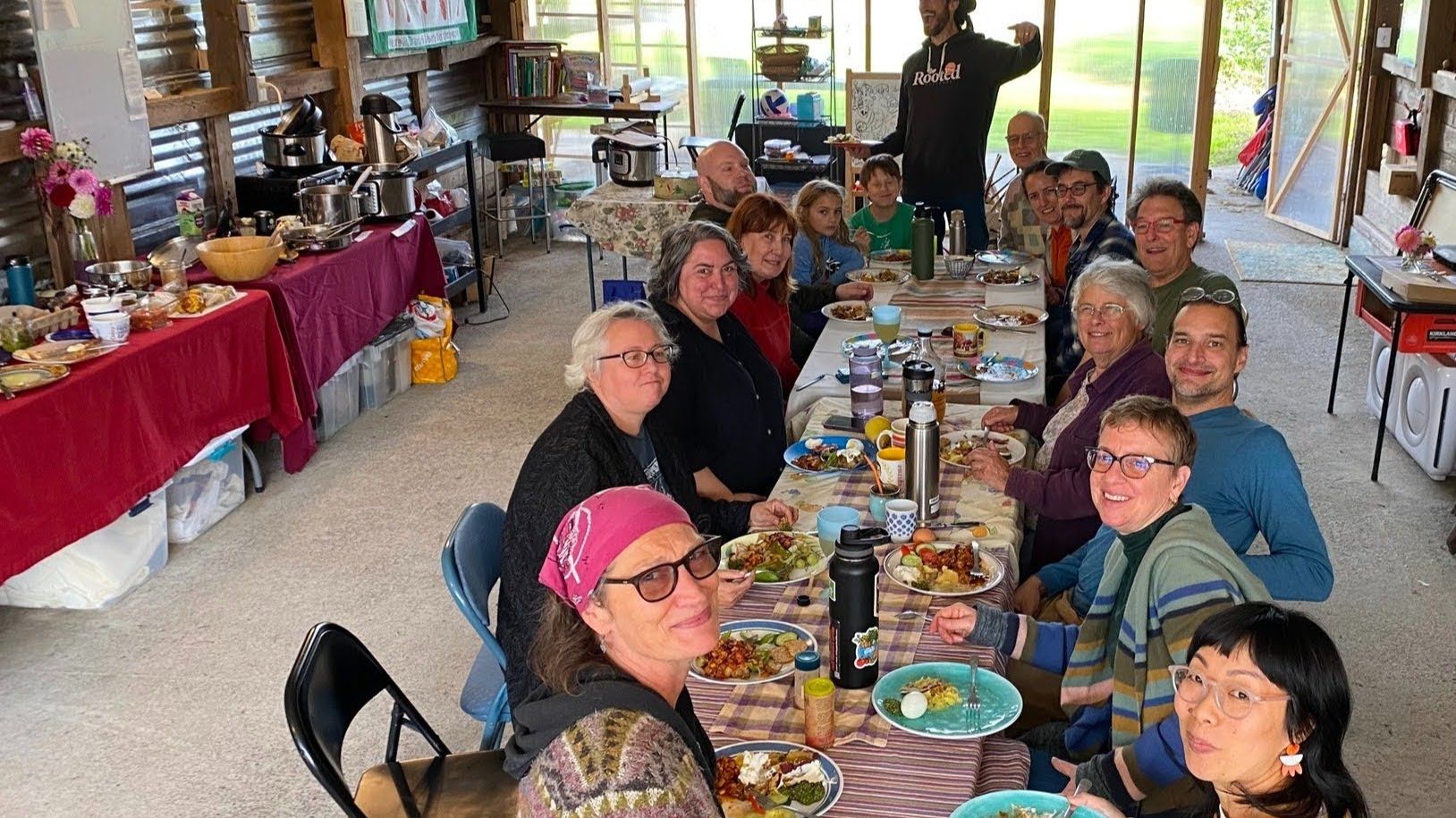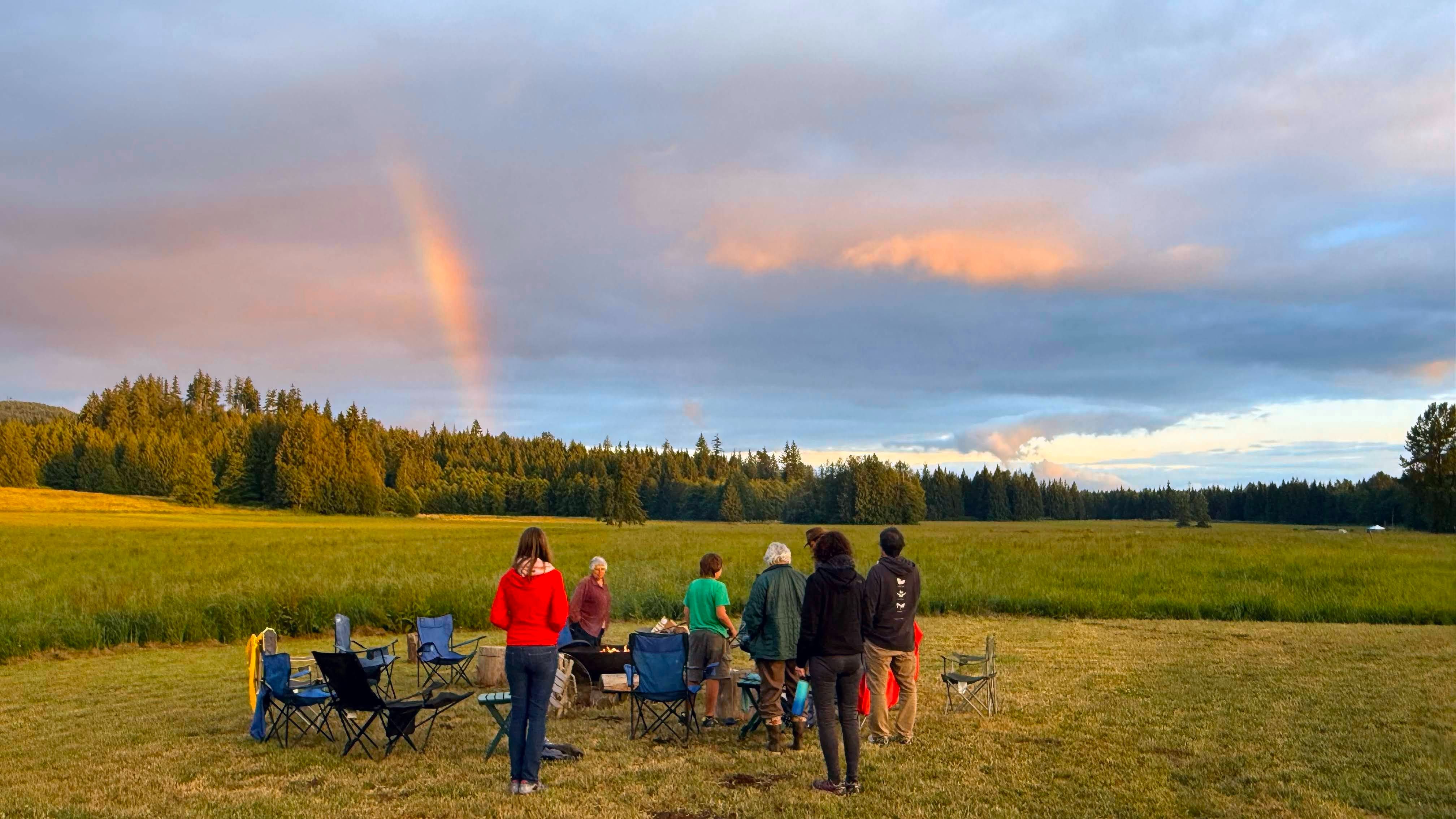
Get to know Rooted Northwest
By Carla, Future Homeowner and Duck Mama
Dear Mom and Papa…Erik and I learned about an intentional community that is being developed on 240 acres of beautiful farm and forest land in Arlington, WA. It’s called Rooted Northwest.. The community will have 2 neighborhoods of homes on a small part of the land and a large common house for community activities, and the rest of the land will be stewarded sustainably for growing food and medicinal herbs and raising livestock. After a few months of exploring the land and interacting with the others who have already joined the community, we have decided to join, too. It seems a huge blessing to have the opportunity to plant, forage, and harvest from such picturesque land alongside people whose company we really enjoy. ~Carla
The above is an excerpt from a letter I wrote to my mom and stepdad in 2021. Four years later, Rooted Northwest still has my heart. From its conception, Rooted Northwest has been driven every step of the way towards good: care of the land, care of people, working for equity. I was not wrong to fall in love with this project.
A Little Rooted Northwest History
And what a project it has been, a real labor of love for the two founding couples. They initially connected around permaculture in 2015, and in what I can imagine must have been an absolute whirlwind of creative synergy and enthusiasm, crafted a vision for a new agrivillage in Washington State (agrivillage = agriculture + village). Originally called “NW Agrivillage,” the vision called for an intentional community purposefully built around regenerative agriculture and education. A vast majority of the land will be shared by multiple farms, which makes farming more economically feasible for those without generational/tech/biomedical wealth. Homes in the community will house those farming the land, as well as regen ag enthusiasts. The homes will be closely clustered together around a central “common house,” a place for shared meals, playing music, playing games, community meetings, and the like. Like most intentional communities, it will be multigenerational, and diverse in many ways.
Longer-term goals include a farm stand and education facilities. These will add value for the Arlington community at large.
“Make only original mistakes” is a guiding motto for the community. We sought not just land for the agrivillage, but the wisdom of others in all aspects of developing property and healthy community. (For the “who’s who” of Rooted Northwest consultants and advisors, check out Rooted NW Advisors.)
Our land explorations led us to a long-time dairy farmer in Arlington, WA, who needed to downsize his farm. His beautiful land included not just haying or grazing fields, but streams, ponds, and forests that fill the soul. If put on the market, this property would likely have been gobbled up by developers and spit out in a conglomerate of McMansions. Many species of birds and animals would have lost valuable habitat. What a perfect spot to preserve!
We eventually settled on the permanent name of Rooted Northwest. We chose it because it demonstrated the importance of the place-based nature of our project and stewardship goals. Significant work went into the negotiation for the land purchase and subsequent planning and permitting. The purchase was final in September of 2020! It took another 4+ years of working with Snohomish County for plat approval though the Rural Village Housing Demonstration Program (RVHDP). The RVHDP allows for more compact village designs to maximize farmland and forest preservation. But here we are, finally looking to break ground for the homes very soon!
The Homes
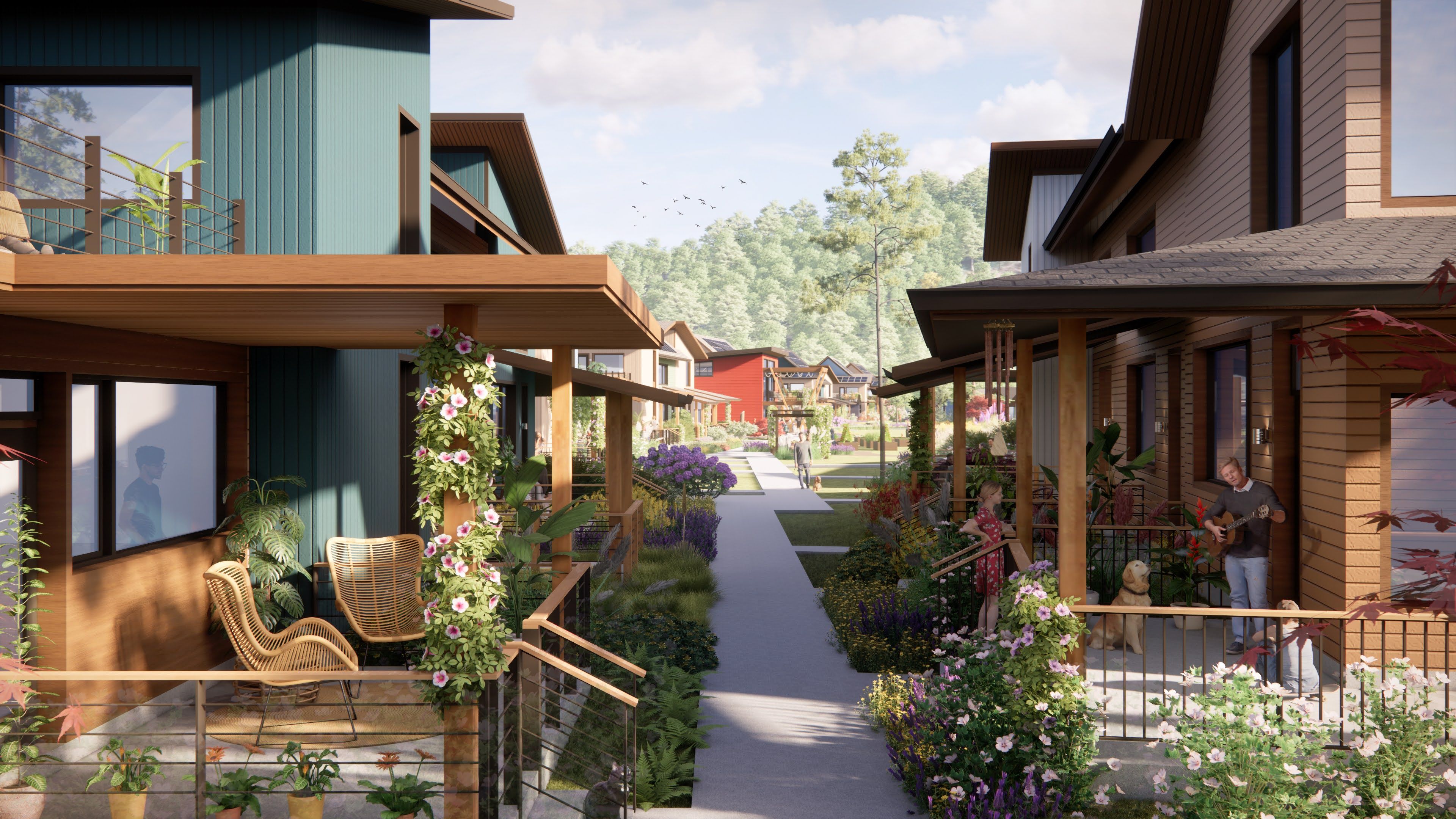
The current design for Village 1 includes 40 homes, the much-looked-forward-to common house, and a habitat pond. Some of them are freestanding homes, but most are part of quadplexes with different unit sizes and layouts to accommodate different needs. We worked with the architect to keep accessibility and aging in place in mind as an option for those so inclined. To help with future financial accessibility, some of the homes will likely be held as rentals. And some of our members intend to leave their home to the community in their will, wanting to leave a legacy for farmers.
Our Shared Values
Since the conception of NW Agrivillage/Rooted NW, the founders have set the tuning fork to attract community members with shared values.
Autonomy with Shared Responsibility: We believe in personal freedom and choices that add to collective good. Nobody exists in a vacuum. Because we care about one another, we work to make personal decisions that do not cause harm.
Ecological Stewardship and Resilience: We work to care for the earth so the earth can take care of us across generations. The monocultures, chronic tilling, and harmful chemicals used in “conventional” agriculture deplete the soil. Instead, all farmers at Rooted Northwest agree to farm following regenerative agriculture principles.
Participatory, Democratic Governance: We are all included in action-oriented governance and decision-making. Each Rooted NW member has the right to ask questions, present information, give opinions, and participate in decision-making in a way that doesn’t easily get bogged down.
Inclusion: We work to acknowledge and undo our collective internal systems of oppression to become a more inclusive and diverse community. Racism, patriarchy, homophobia/transphobia, ageism, ableism…Society has baked these into our collective psyches from birth, but each of us is committed to lifelong growth. What could be better than everyone belonging?
Meaningful Work: We offer an opportunity to live a life that is deeply satisfying. This applies to farmers, yes, but also to the other “work” tasks involved in community life and service to something greater than yourself.
Rooted NW Community
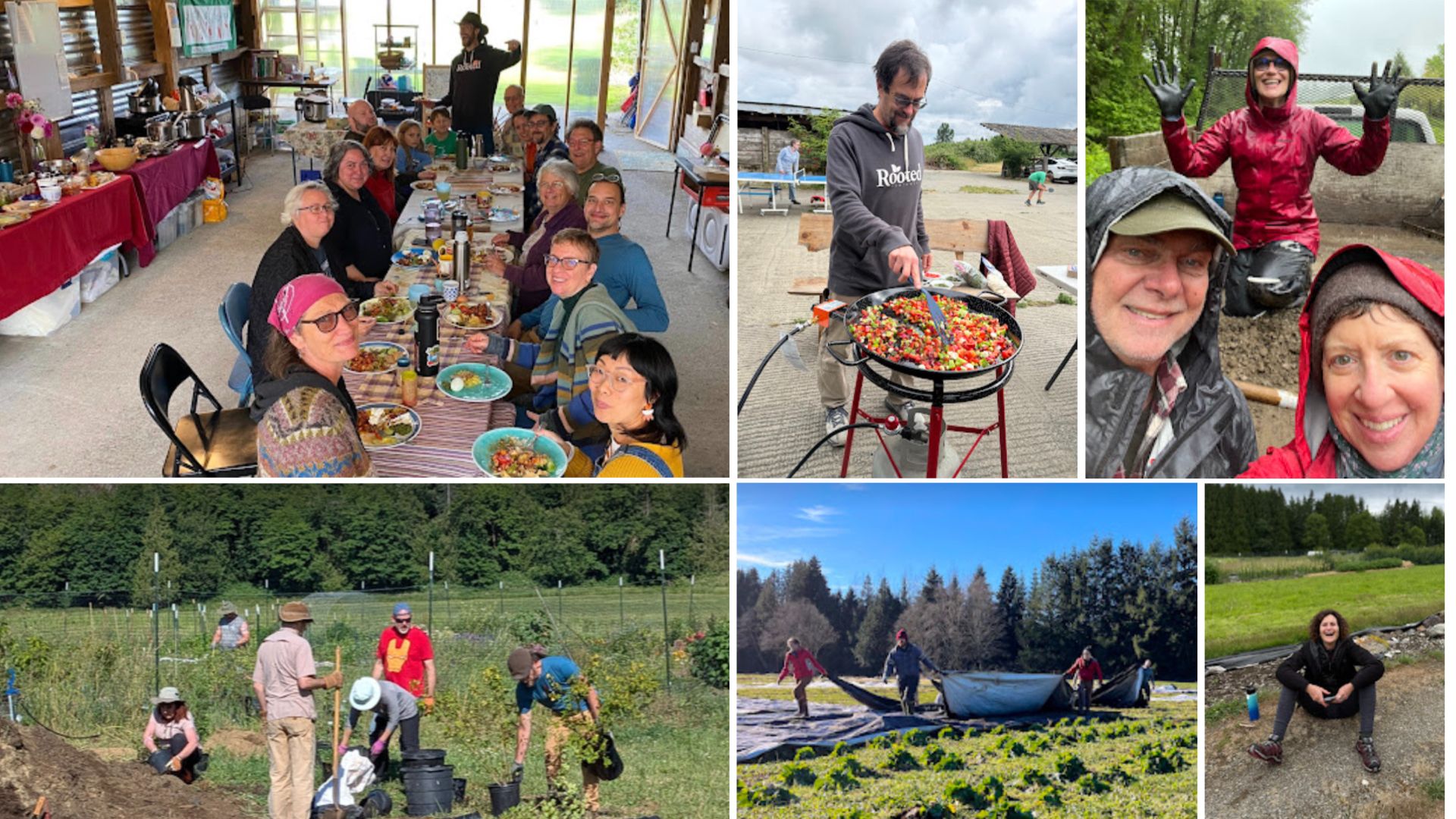
Rooted NW membership has ebbed and flowed over the last few years. The COVID pandemic made in-person gatherings more of a challenge, but between Zoom calls, outdoor gatherings, and carefully executed indoor get-togethers, Rooted NW members have developed what we call “community glue.” Every two weeks, we meet online for a “village gathering.” Every single time, my heart leaps when I see each person “in the squares.” We hold monthly work parties on the land – 240 acres means there’s always something to do! (In my opinion, the most fun tasks we do are the ones that directly help the current farmers.) We snack and enjoy potluck lunch and dinner in the “early common house,” a barn left from the former dairy farm that we’ve converted into a community space. Some members are fortunate to live close to one another and do more frequent in-person activities. Some live in other states or countries and can only join in person with significant planning and travel. We ALL look forward to the day we live at Rooted NW.
Farming at Rooted NW
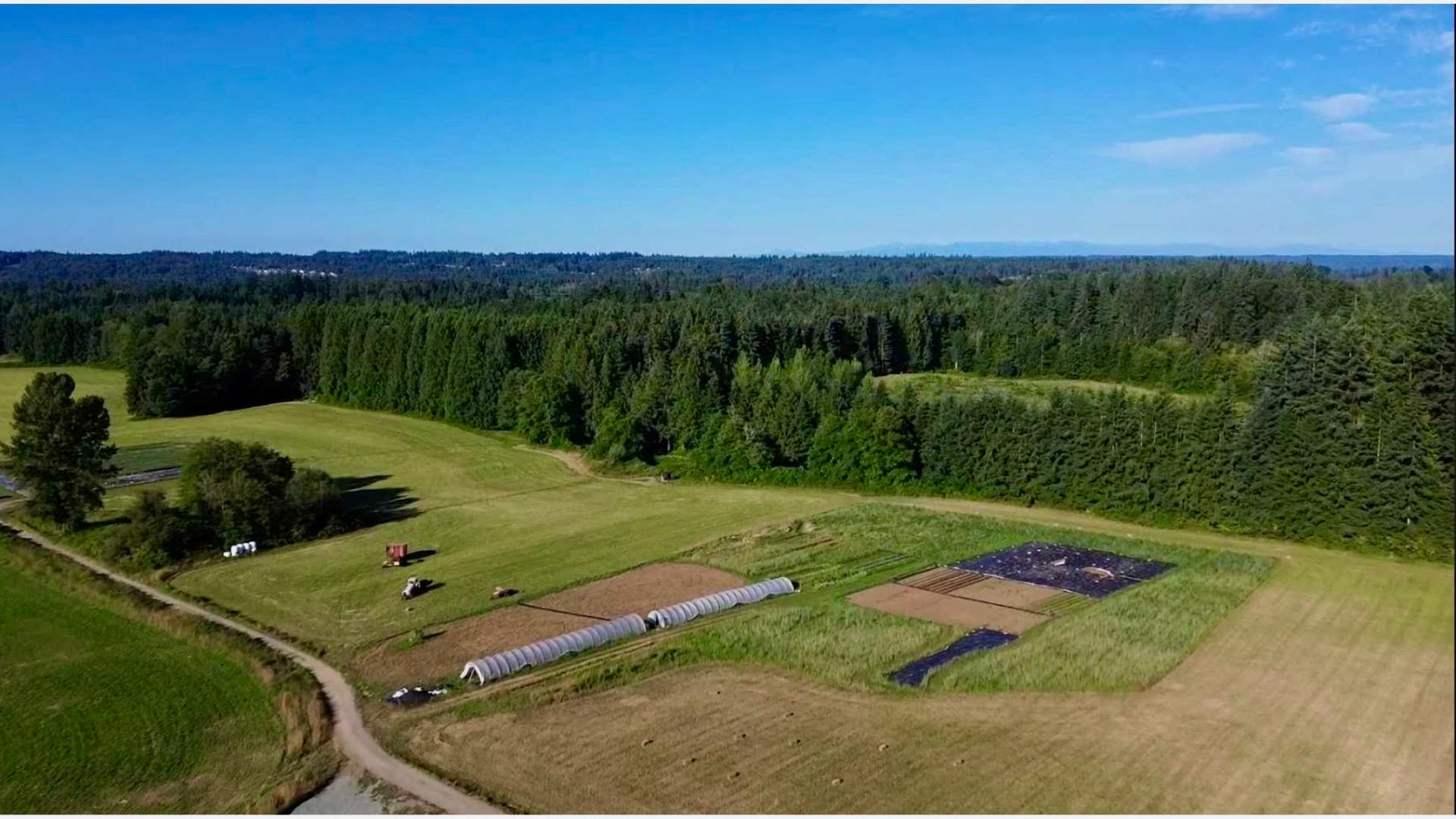
A few of our core people have already started their farms a Rooted NW. (Check out Reconnecting Roots Farm and River Raven Herbs for two examples.) Some of us have aspirations for when the homes are built and we get to live there. (Like me! @duckdramamama - my pet ducks live there now, but someday I hope to steward a much larger flock.) We are also excited to provide land to several farmers who do not currently plan to purchase a home at Rooted NW. All the farmers bring great energy to the community, as well as fantastic produce, herbs, teas and tinctures, eggs, pork, and flowers.
Governance and Decision-Making
The founders’ research led them to “sociocracy” as a practice for Rooted NW members to use for making decisions affecting the community. You know how you can be in a meeting and you just can’t get a word in edgewise? Sociocracy’s approach of speaking in “rounds” gives each member equal opportunities to weigh in on a topic, and equal voice when it comes to consenting or withholding consent. It’s such a relief for folks who might otherwise be anxious about participating! Each person may speak or pass in a round; the facilitator will come back to them after everyone has spoken in case they have something to say after all. Anyone who withholds consent must propose a different option. The aim is always to make decisions that are within the “range of tolerance” for everyone in the community. No one person or sub-group holds power. We all share the power. And we invest in helping everyone to learn this system of governance to make sure that happens.
Sociocracy’s format of “circles” (or committees) for organizing our work has proven beneficial as well. The Coordinating Circle, made up of a Leader and a Delegate from all of the Department Circles, creates and consents on “aims and domains” for the Department Circles. This divides the work into appropriate groups. And some of the Department Circles then create Sub-Circles for related but special-focus areas.
Currently, our Department Circles include: Agriculture (no surprise), Outreach, Development Liaison, Finances/Legal, and Process. The Leader in each Circle communicates responsibilities handed down from the Coordinating.Circle; the Delegate communicates the Department Circles’ decisions to the Coordinating Circle. The leader and facilitator work together to create the agenda for their Circle, and a logkeeper makes sure notes are taken during the meeting .
You can find more information about sociocracy where we did: www.sociocracyforall.org
Nonviolent Communication (NVC)
Even with shared values and a practice for sharing power, we do still experience the occasional conflict. We aspire to work through conflict in ways that build us up rather than cause harm. Using Nonviolent Communication (NVC) we work to identify our feelings and met/unmet needs, and to listen and respond with empathy when others are sharing.
NVC and conflict resolution are so important to us that we have professional consultants to provide training and to mediate when needed.
Here are two fantastic resources for learning NVC:
- Nonviolent Communication by Marshall B. Rosenberg, Ph.D. https://www.cnvc.org/store/nonviolent-communication-a-language-of-life
- Decolonizing Non-Violent Communication by Meenadchi https://shop.fccwla.org/products/decolonizing-non-violent-communication
If you’d like more information you can sign up for an online Info Session.
Attended an Info Session already? Take the next step and email us to set-up a tour of the land. Contact us or send email to [email protected].

